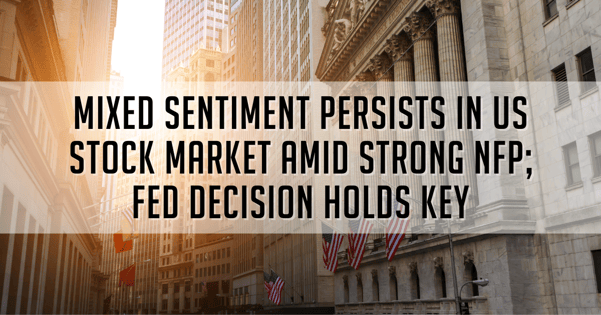The US stock market has been a turbulent landscape recently, as investors grapple with mounting concerns over inflation, sluggish economic growth, and the trajectory of interest rates. Despite this volatility, some sectors, particularly the technology industry, have witnessed remarkable gains, propelling the overall market forward.
A select group of tech giants, including Apple, Amazon, Microsoft, and Google parent Alphabet, has been instrumental in driving the recent surge. Their impressive earnings and revenue growth have triggered a corresponding increase in stock prices, cementing their position as market leaders.
Nevertheless, market observers express reservations about the narrowness of the ongoing rally. Should a market correction materialise, the implications could be substantial, potentially resulting in a significant downturn as investors opt to offload their holdings. Furthermore, the current market upswing leaves little margin for error, rendering investors vulnerable to sudden and pronounced price swings.
Despite these concerns, recent positive economic indicators have instilled confidence among investors, bolstering their faith in the economy and the stock market. The May job report, for instance, revealed the addition of a substantial 339,000 jobs, surpassing initial expectations.
However, there are some caveats to the positive employment data. The unemployment rate inched up to 3.7% from 3.4%, and wage growth witnessed a deceleration, with a monthly rise of 0.3% compared to 0.4% in April. These developments have raised concerns about the persistence of inflation and provided ammunition to sceptics who question market expectations for future rate cuts.
While the job report underscores the economy's robustness, inflation remains a significant concern. Many economists believe that escalating inflation could prompt higher interest rates, eroding stock values and diminishing their allure to investors.
In addition to inflation worries, the health of the banking sector is also under scrutiny. In a recent report, the Federal Reserve cautioned that financial institutions are growing apprehensive about future conditions. Troubles within mid-sized US banks have prompted lenders to tighten lending standards for households and businesses. Loan officers at the Fed have indicated that these issues are likely to persist due to lowered growth forecasts, concerns over deposit outflows, and a diminished appetite for risk.
Against this backdrop, policymakers vigilantly monitor economic indicators and adjust their strategies accordingly. The Federal Reserve has incrementally raised interest rates on seven occasions since December 2015, with the most recent hike occurring in March of this year.
Market sentiment surrounding future rate hikes remains uncertain. Fed-funds futures traders have priced in a 27.6% probability of a 25-basis point rate increase at the upcoming June 13-14 policy meeting, representing an increase from 20.4% on Thursday but a significant decrease from 64.2% a week earlier. These reduced odds reflect the prevailing market expectation that policymakers will maintain rates at their current levels this month.
While the Fed's actions have played a role in stabilising the economy, they have also contributed to the narrowing of the stock market rally. Higher interest rates translate to increased borrowing costs for companies, potentially diminishing their profitability and rendering their stocks less attractive to investors.
In summary, the US stock market currently presents a blend of optimism and caution. While the recent market surge has rewarded investors handsomely, the inherent risks associated with the narrowness of the rally, coupled with concerns surrounding inflation and the banking sector, raise the possibility of an intermediate-term correction unless market breadth expands.
In the coming months, market participants will closely monitor how policymakers navigate these challenges and whether the market can sustain its upward trajectory. Many analysts maintain an optimistic outlook, asserting that the US economy remains fundamentally strong and poised for continued growth in spite of existing risks.
Fullerton Markets Research Team
Your Committed Trading Partner











